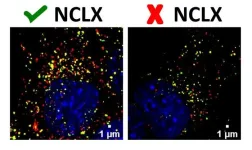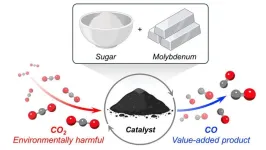(Press-News.org) An article published in The Faseb Journal describes a Brazilian study analyzing the correlation between two key energy metabolism regulation processes: the absorption and release of calcium ions by mitochondria, the organelles that generate energy for cells; and autophagy induced by calorie restriction. Autophagy occurs when cells break down and reuse their own cytoplasm.
The study was conducted at the Center for Research on Redox Processes in Biomedicine (Redoxome), a Research, Innovation and Dissemination Center (RIDC) funded by FAPESP and hosted by the University of São Paulo’s Institute of Chemistry (IQ-USP).
Redoxome’s researchers, led by Alicia Kowaltowski, a professor at IQ-USP, showed that the protein NCLX, the transporter responsible for calcium ion efflux, is a key regulatory node integrating mitochondria, autophagy control by calcium ions and cellular responses to nutrient availability, thereby establishing the link between autophagy and mitochondrial calcium.
“Our findings are important because of this link between processes. Both mitochondria and autophagy are involved in metabolism, so it makes sense that they’re connected. Researchers in cellular biology tend to see things separately, but we should bear in mind that in cells one process depends on and regulates the other. Although the study was fundamental science, which may seem somewhat abstract, this knowledge will certainly be useful to help develop targets for the treatment of various diseases,” said Vitor de Miranda Ramos, a member of the Redoxome team and first author of the article.
Ramos conducted part of the study while working in Viktor Korolchuk’s laboratory at Newcastle University in the United Kingdom, with support from FAPESP via a research internship abroad (BEPE).
As well as producing energy for cells, mitochondria participate directly in several calcium-sensitive cellular regulation pathways, thanks to their capacity to absorb and release calcium ions. Mitochondrial uptake of calcium ions is mediated by the mitochondrial calcium ion uniporter complex. NCLX, the mitochondrial Na+/Li+/Ca2+ exchanger, releases calcium ions from the mitochondrial matrix into the space between the inner and outer membranes in exchange for sodium ions.
Calcium affects almost all aspects of cellular life. Calcium ions are well-known second messengers in metabolic signaling and play an important role in the regulation of autophagy.
Cell recycling
Autophagy, a process highly conserved by evolution, consists of the degradation and recycling of cell components with the primary aim of maintaining cellular homeostasis. Because it removes unwanted elements and promotes nutrient availability, it is necessary for quality control, tissue renewal and metabolic regulation.
In addition to its basic functions, autophagy is activated in response to a decrease in nutrient availability and is considered one of the mechanisms responsible for the benefits of calorie restriction.
In the study, as a starting point for their investigation of the link between mitochondrial calcium transport and autophagy, the researchers submitted mice to four months of calorie restriction and found their liver mitochondria to contain higher levels of NCLX than samples from mice fed an unrestricted diet. They then used cultured liver cells to create models that mimicked calorie restriction and again observed an increase in NCLX expression.
Mechanism
After making measurements at different stages of the autophagy process, the researchers found that NCLX activity affected the initial steps in the process. In autophagy, cell components are sequestered by autophagosomes (vesicles that engulf the material to be degraded) and these in turn fuse with lysosomes to promote the digestion of organelles or proteins. The data obtained in the study led the researchers to conclude that alterations in intracellular calcium resulting from NCLX inactivation interfered with autophagosome formation, impairing the initial steps of autophagy.
Contrary to expectations, the researchers also found that NCLX inhibition did not affect mitochondrial production of adenosine triphosphate (ATP, the molecule that provides energy for cells) or AMP-activated protein kinase (AMPK), which increases when cell energy slumps.
“Regulation of autophagy by NCLX takes place via cellular calcium independently from the AMPK pathway,” Kowaltowski said.
According to the authors, more research is needed to elucidate the complex mechanisms of autophagy control by cytoplasmic calcium. “Calcium signaling is evidently very complex, and possibly ubiquitous in the cell: many proteins can bind to and be regulated by calcium, so it’s difficult to arrive at a specific mechanism,” Ramos said.
The brain uses a great deal of energy and needs many mitochondria. Accumulating cell damage can lead to cell death and the development of pathologies. “While we didn’t look specifically at pathological contexts, the link between calcium signaling and autophagy is interesting because it may relate to disease progression. When this transporter’s activity is lost, considerable damage ensues, and the process of clearing up this damage via autophagy is impaired. Future research will be able to clarify this further,” Kowaltowski said.
END
Study helps understand how energy metabolism is regulated at cellular level
An article published by a FAPESP-supported research center highlights the link between mitochondrial calcium transport and autophagy, the process whereby cells break down and reuse some of their own components
2024-05-02
ELSE PRESS RELEASES FROM THIS DATE:
Stay active – or get active – to boost quality of life while aging, study suggests to middle-aged women
2024-05-02
Consistent adherence to physical activity guidelines throughout middle-age is associated with a higher health-related quality of life in women, according to a new study publishing May 2nd in the open-access journal PLOS Medicine by Binh Nguyen of University of Sydney, Australia, and colleagues.
The evidence for an association between physical activity and health-related quality of life has been based primarily on cross-sectional studies and short-term randomized controlled trials. Few longitudinal studies have measured physical activity at more than one time point and examined the long-term causal effects ...
*FREE* Friendship-nomination approach identifies key villagers to diffuse health messages
2024-05-02
In experiments in isolated villages in Honduras, researchers evaluated a new strategy for identifying individuals that could be targeted for effective information spreading. Their approach – more effective than random targeting, and also less time-requisite than approaches that require a complete understanding of the relevant social network – could have far-reaching policy implications in lower and middle-income countries. Understanding the structure and function of human social networks has yielded insights for exploiting social ...
Chromosomal 22q11.2 deletion confers risk for severe spina bifida
2024-05-02
Chromosomal 22q11.2 deletions increase risk for meningomyelocele, one of the most severe and common forms of spina bifida, researchers report. According to the findings, this risk is mediated by the loss of Crkl, one of several neural tube expressed genes located on the 22q11.2 deletion interval, and this risk is only partially alleviated by folate supplementation. Meningomyelocele (MM) is a severe type of neural tube defect, which often requires pre- or post-natal surgical repair and can result in a variety of physical and developmental difficulties. Although the incidence of the condition has declined in recent decades, largely due to folic acid (FA) fortification, MM ...
Circadian clocks in the brain and muscles coordinate to support daily muscle function
2024-05-02
Molecular circadian clocks in the brain and muscle tissue cooperate to keep muscles healthy and functioning daily, according to a new study in mice. The findings could provide valuable insight into understanding the roles of circadian disruption in age-associated health issues and potential strategies to protect muscle function in aging individuals. A circadian molecular clock network is crucial for daily physiology and maintaining health. It’s thought that this network – which extends throughout all cells in the body – is hierarchically organized and coordinated by the brain’s suprachiasmatic nucleus (SCN), which receives daily light cues and synchronizes ...
*FREE* The effectiveness of early childhood education programs is scientifically uncertain
2024-05-02
Early care and education (ECE) programs – like Pre-Kindergarten (Pre-K) and Head Start – are widely regarded as effective public investments for reducing income- and race-based achievement gaps and helping children succeed in school with impacts extending well into adulthood. However, in a Policy Forum, Margaret Burchinal and colleagues present recent evidence suggesting that preschool impacts are not unequivocally positive and the science on the overall outcomes of these programs remains unsettled. According to Burchinal et al., more rigorous research is needed to understand how to design early education programs that produce long-term positive ...
Twisting and binding matter waves with photons in a cavity
2024-05-02
Precisely measuring the energy states of individual atoms has been a historical challenge for physicists due to atomic recoil. When an atom interacts with a photon, the atom “recoils” in the opposite direction, making it difficult to measure the position and momentum of the atom precisely. This recoil can have big implications for quantum sensing, which detects minute changes in parameters, for example, using changes in gravitational waves to determine the shape of the Earth or even detect dark matter.
In a new paper published in the Science, JILA and NIST Fellows Ana Maria Rey and James Thompson, ...
Sugar-based catalyst upcycles carbon dioxide
2024-05-02
A new catalyst made from an inexpensive, abundant metal and common table sugar has the power to destroy carbon dioxide (CO2) gas.
In a new Northwestern University study, the catalyst successfully converted CO2 into carbon monoxide (CO), an important building block to produce a variety of useful chemicals. When the reaction occurs in the presence of hydrogen, for example, CO2 and hydrogen transform into synthesis gas (or syngas), a highly valuable precursor to producing fuels that can potentially replace gasoline.
With recent advances in carbon capture technologies, post-combustion carbon capture is ...
Deeper understanding of malaria parasite sexual development unlocks opportunities to block disease spread
2024-05-02
For the first time, the developmental stages of the deadliest human malaria parasite have been mapped in high resolution, allowing researchers to understand this ever-adapting adversary in more detail than previously possible.
The study, published today (2 May) in Science, details the critical developmental stages of the malaria parasite, Plasmodium falciparum, using single-cell RNA sequencing. This gives detailed information on the life stages of this parasite as it matures, changing from an asexual state to a sexual state, which is necessary before the parasite can be transmitted to mosquitoes.
The research from ...
Breaking ground: Investigating the long-term effects of early childhood education
2024-05-02
EMBARGOED TO 2:00 P.M. ET May 2, 2024
Contact: Patricia Lamiell; patricia.lamiell@tc.columbia.edu or Ari Morgan; teacherscollege@skdknick.com
Breaking Ground: Investigating the Long-Term Effects of
Early Childhood Education
New review from Teachers College, Columbia University, University of Virginia, University of California-Irvine, and University of Delaware Reveals Varied Impact of Preschool Programs on Long-Term School Success.
EDITOR’S NOTE: The EMBARGOED ...
Synchronization between the central circadian clock and the circadian clocks of tissues preserves their functioning and prevents ageing
2024-05-02
Barcelona, 2 May 2024 - Discovered in the 1970s, circadian clocks are essential for the regulation of biological time in most cells in the human body. These internal mechanisms adjust biological processes to a 24-hour cycle, allowing the synchronisation of cellular functions with daily variations in the environment. Circadian rhythms, which are coordinated by a central clock in the brain that communicates with clocks in different peripheral tissues, influence many functions, from our sleep patterns to our ability to metabolise food.
A team led by Dr. Salvador Aznar Benitah, an ICREA researcher ...
LAST 30 PRESS RELEASES:
Brain cells drive endurance gains after exercise
Same-day hospital discharge is safe in selected patients after TAVI
Why do people living at high altitudes have better glucose control? The answer was in plain sight
Red blood cells soak up sugar at high altitude, protecting against diabetes
A new electrolyte points to stronger, safer batteries
Environment: Atmospheric pollution directly linked to rocket re-entry
Targeted radiation therapy improves quality of life outcomes for patients with multiple brain metastases
Cardiovascular events in women with prior cervical high-grade squamous intraepithelial lesion
Transplantation and employment earnings in kidney transplant recipients
Brain organoids can be trained to solve a goal-directed task
Treatment can protect extremely premature babies from lung disease
Roberto Morandotti wins prestigious Max Born Award for pioneering research in quantum photonics
Scientists map brain's blood pressure control center
Acute coronary events registry provides insights into sex-specific differences
Bar-Ilan University and NVIDIA researchers improve AI’s ability to understand spatial instructions
New single-cell transcriptomic clock reveals intrinsic and systemic T cell aging in COVID-19 and HIV
Smaller fish and changing food webs – even where species numbers stay the same
Missed opportunity to protect pregnant women and newborns: Study shows low vaccination rates among expectant mothers in Norway against COVID-19 and influenza
Emotional memory region of aged brain is sensitive to processed foods
Neighborhood factors may lead to increased COPD-related emergency department visits, hospitalizations
Food insecurity impacts employees’ productivity
Prenatal infection increases risk of heavy drinking later in life
‘The munchies’ are real and could benefit those with no appetite
FAU researchers discover novel bacteria in Florida’s stranded pygmy sperm whales
DEGU debuts with better AI predictions and explanations
‘Giant superatoms’ unlock a new toolbox for quantum computers
Jeonbuk National University researchers explore metal oxide electrodes as a new frontier in electrochemical microplastic detection
Cannabis: What is the profile of adults at low risk of dependence?
Medical and materials innovations of two women engineers recognized by Sony and Nature
Blood test “clocks” predict when Alzheimer’s symptoms will start
[Press-News.org] Study helps understand how energy metabolism is regulated at cellular levelAn article published by a FAPESP-supported research center highlights the link between mitochondrial calcium transport and autophagy, the process whereby cells break down and reuse some of their own components




